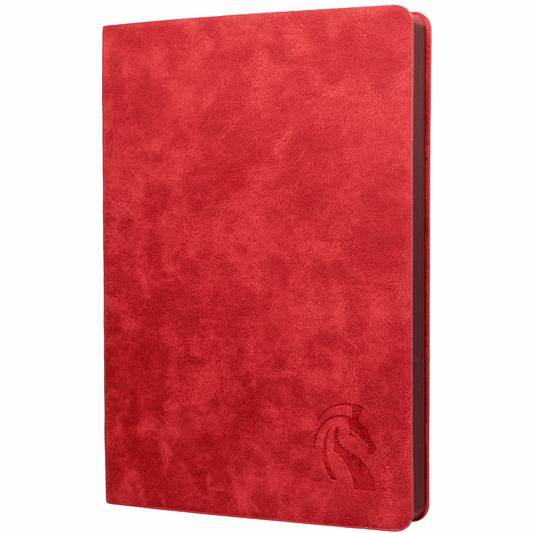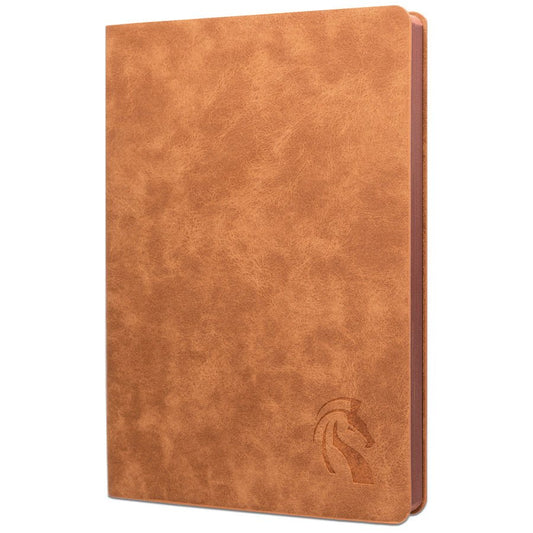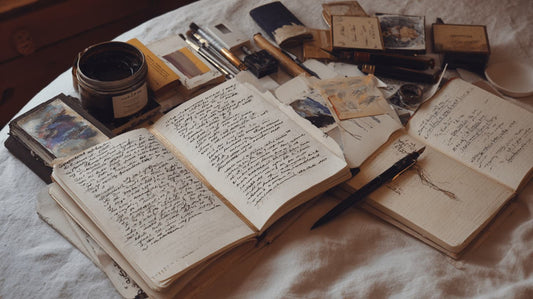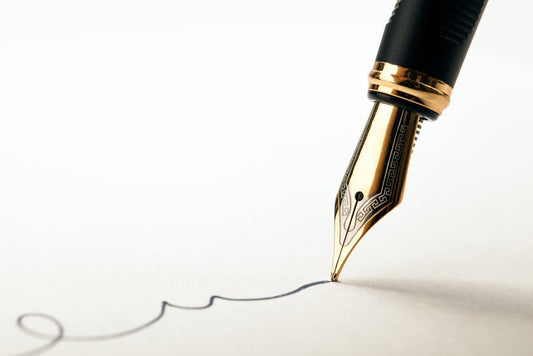
I hadn't used a fountain pen in years, and I was under the impression that it wasn't a practical choice for day-to-day writing. My opinion has shifted after I've used fountain pens for the past four years, and I don't think it will ever be the same again.
Is a fountain pen a decent choice for writing every day? If you choose the proper model for your requirements, fountain pens can be useful for everyday use for the vast majority of individuals. In addition to being more comfortable to write with, they are also more durable and adaptable than other pens. However, if you are constantly taking fast notes, for example on a clipboard, you may find that fountain pens are not the most convenient alternative.
There are a few things to keep in mind when using a fountain pen, and you may find that in certain circumstances it is more convenient to write with a ballpoint. I'll go into detail about those below.
Is Moleskine good for fountain pens?
This essay will discuss:
Why You Should Consider Using a Fountain Pen on a Daily Basis
If you use a fountain pen, are you able to write normally?
There are many significant benefits to using fountain pens.
Before You Buy Your Everyday Fountain Pen, Here Are Some Things to Think About
Why You Should Consider Using a Fountain Pen on a Daily Basis
For the vast majority of people and in the vast majority of circumstances, fountain pens are, in my opinion, by far the best everyday writing tool, particularly for people who have regular desk jobs like I do. The simplicity of their design is the primary factor that leads me to believe that they are superior to pencils and ballpoints. They are more enjoyable to write with, more ergonomic, and provide a more pleasurable writing experience overall. However, they are not suitable for everyone, and the pleasure of writing with a fountain pen is not something that appeals to everyone.

You should try writing with a fountain pen if you are interested in the finest possible writing experience or if you are currently experiencing hand tiredness. My general opinion is that you should try using a fountain pen.
From what I've seen, the vast majority of people who loathe fountain pens have generally had some kind of negative experience with them. Either they did not receive the correct sort of pen or it did not function correctly. It was either dry, skipping, or difficult to get the pen started. Or there was a leak! These are all genuine issues that can arise while using a fountain pen; however, over the course of the past few years that I've been using them, I've discovered that it is possible to fully sidestep each of these issues.
The primary catch is that you will need to determine what kind of fountain pen will work best for your purposes. Fountain pens are wonderful writing implements for almost any circumstance; all you need to do is determine what kind of pen would work best for you.
The benefits will be discussed in greater depth in the following paragraphs. However, before we get into that, I first wanted to offer you a little rundown of the benefits and drawbacks of using a fountain pen, as well as a discussion of the circumstances in which you might want to steer clear of using one entirely.
What are the benefits and drawbacks of using fountain pens
Advantages:
enables writing without the need for pressure, is more ergonomic, more durable, provides a more pleasant writing experience, is more enjoyable, more personal, and offers more alternatives.
You are not going to misplace your fountain pen.
You will be responsible for your own maintenance and refills, despite the fact that these tasks are simple.
The inks used in fountain pens are water-based.
It is a painful experience if you misplace your fountain pen.
When first starting out, classic models have a tendency to dry out if left uncapped and without writing. This can be overwhelming if the virus infects you, and you will buy too many.
Do not worry about it even if you find everything to be somewhat overwhelming. I'm going to wrap off this article by going through the most essential information one should have before getting started.
When you should probably not use a fountain pen
People whose jobs involve delivering packages, supervising warehouse workers, making sales door-to-door, and others should definitely steer clear of using fountain pens while on the job. If you need to make quick notes on a clipboard while you're moving around, a ballpoint pen is perhaps the most convenient writing instrument to have on hand. If you have to use carbon copy paper, fountain pens won't work very well since you don't want to apply too much pressure while you're using a fountain pen because it can ruin the nib. Additionally, fountain pens won't function very well if you have to use graph paper. Despite this, there is a workaround available in the form of a pen fitted with an accounting nib.
When using a fountain pen, the nib is the part of the pen that actually touches the paper, and nibs come in a wide variety of styles, dimensions, and configurations.
Let's say you have a habit of keeping the cap off of your pen throughout the day. You might, for instance, jot down some notes here and there throughout the day, but not constantly. It's possible that a ballpoint pen or pencil would work better. When left unscapped, fountain pens, particularly older models, have a propensity to dry out.

However, if you are set on using a fountain pen despite either of these challenges, there are strategies available to help. You could acquire a hooded nib or a capless pen like the Pilot Vanishing Point (check it out, it's a wonderful fountain pen), either of which would prevent the ink in the pen from drying out.
A fountain pen is not the best choice for you if you do not enjoy maintaining your pen (which consists of merely flushing it once a month) or if you do not want to consider your pen at all. However, given that you are here reading this post, my hunch is that it is not you who is in question.
If you use a fountain pen, are you able to write normally?
Fountain pens don't require any specific method. The majority of fountain pens need that you write with a somewhat lighter touch, however there are nibs available that are able to bear a bit greater pressure. Aside from that, writing with the vast majority of fountain pens is virtually identical to writing with a ballpoint or pencil.
Therefore, the only other thing that has to be done is to write more gently. There are challenging pens available, which feature a sweet spot of some kind, but if you purchase the correct starting pen, this shouldn't be an issue for you at all. In fact, I would go so far as to argue that writing with a fountain pen is far simpler than writing with a ballpoint or even a rollerball (or gel pens).
There are many significant benefits to using fountain pens.
They write with relative ease.
In contrast to ballpoint pens, writing with a fountain pen doesn't require any pressure because it's done under the pen's own weight. In addition to this, the grip area of the pen is often larger than that of a ballpoint, which helps to alleviate hand strain and fatigue. A good fountain pen is a wet writer, which means that it lays down a great deal more ink on the paper than a ballpoint pen or even a gel pen would. This is because a fountain pen is a nib rather than a tip. The ink that is used in fountain pens is liquid, but the ink that is used in ballpoint pens is more like a paste.
They can be refilled, making them both economical and friendly to the environment.
The vast majority of pens are made of disposable plastic. That does not sit well with me in the least, especially considering how straightforward and simple the process of filling ink is. The fountain pen is the pinnacle of all pens that can be refilled because it merely requires a click to replace the cartridge. If you have a converter, you won't even need to worry about replacing the plastic cartridges; instead, you'll simply be able to take the ink directly from the bottle.
You have your choice of inks available.
In comparison to the ink found in ballpoint pens, the majority of the inks designed for use with fountain pens are of a much higher quality. You are free to use any color or ink you'd want to decorate her with. For archival purposes, some inks have properties that make them "bulletproof," which includes being resistant to water, lasers, and freezing temperatures, among other things. There are some inks that have a shimmer that is unique to them. And for the vast majority of them, you can purchase samplers for as little as a buck or two each.

The vast majority of my ink was purchased all at once...
Before You Buy Your Everyday Fountain Pen, Here Are Some Things to Think About
Before you go out and get your first fountain pen, there are three primary factors to think about:
what size nib you want
what length of the pen do you prefer?
what kind of ink do you prefer, if any?
There are four different line widths available for fountain pens: extra fine (EF), fine (F), medium (M), and broad (B) (B). If this will be your first time using a fountain pen, I suggest going with either a Fine (F) or Medium (M) nib.
The size of your handwriting and the kind of paper you intend to use are two factors that can help you rapidly establish the size of the nib you require.
On what kind of paper do you plan to write?
You should experiment with the Fine nib if you typically write on standard paper (such as copy paper or regular notepads, for example). It is recommended that you use the Medium nib when writing on paper of a higher quality, such as that found in journals from Moleskine or Leuchtturm.
How big is your handwriting, generally speaking?
It is recommended that you start with a Fine (F) or Extra Fine (EF) nib if your handwriting is very small. If you have huge handwriting, the Medium (M) nib is the one you should start with. Choose a pen with a Medium (M) nib and make sure you have the appropriate ink if you have huge handwriting but want to utilize inexpensive paper. Noodler's X-Feather is a non-feathering ink that works well on cheaper paper because it does not bleed through.
What kind of sizes are your hands?
Your hand size will determine the appropriate size of the pen for you to use. Bigger hands = bigger pens. Going to a physical store and trying out a variety of pens is the most effective method for determining which pen size is most suitable for you. On the other hand, if you don't feel like doing that, I've included some top-notch pens down below.
Where should one begin their search?
If you are thinking about purchasing your first fountain pen, the following are some affordable options that are both high-quality and suitable for beginners.
The Jinhao X450 is a thicker pen that has a nice nib and is great for larger hands and handwriting. It is also quite inexpensive.
Platinum Preppy is a lighter pen that comes in at a very affordable price.
The Lamy Safari is a versatile pen that is suitable for holding on a tripod and is lightweight. Although it is a bit more pricey, it has replaceable nibs (try out multiple nibs on cheaply)
When writing on inexpensive paper, one of the best beginning pens, the Pilot Metropolitan, with its Medium (M) nib, performs really well.
The community of people who use fountain pens is quite familiar with and respectful of these, and you won't be let down by them.

LeStallion PU Leather Journals
LeStallion Soft Cover PU Leather Journals inspires and excites you to write more, allow you to further grow and develop, so you may achieve your goals and dreams!
SHOP LESTALLION













